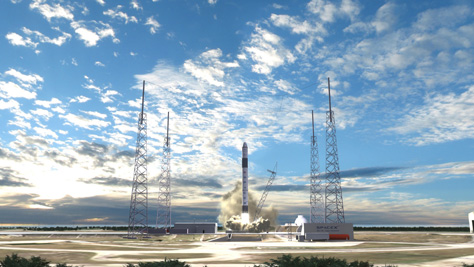
SpaceX Falcon 9 Dragon liftoff from Space Launch Complex 40 at the Kennedy Space Center
It must be hard to schedule a rocket launch. I mean, you have to figure out the logistics of securing a launchpad, and you have to figure how to get a rocket there, which means you have to figure out how to build a rocket, which means you have to be a rocket scientist.
You need to go through a minute by minute script of your mission. Then you need to go through it again. And then you need to go through it again to make sure you didn't make any mistakes when you went through it after you went through the first time. You need to figure out when you have to have the mission completed by, and then you need to count backwards from there to figure out when you need to launch.
Then you have to test the pad. And the rockets. And every hose and wire that connects to it.
And then everything has to go right.
This of course all presumes that you have a launch pad.
If you don't have a launchpad, you need to borrow somebody else's. Once you reach that stage (ahem), you're pretty much at their whim. There aren't too many private companies with their own launch pad these days, so if you're a private company with a spaceship, you're kinda out of luck.
So if you came here today because of my previous post expecting to read and watch my report on the launch of the SpaceX Falcon 9 to the International Space Station, you may notice that there's no such report here. That's because something went wrong. Turns out to be a rather minor something, discovered during a software test a week and a half ago, but something wrong nonetheless.
The CEO of the company that wrote the software that connects the spacecraft to the space station decided he wanted to make sure that software would work, and then he wanted to make sure he was sure, and that he wanted to take some time to be sure that his assurance was sure. I can't say that I blame him.
So they abandoned the April 30 date. That immediately allowed NASA to move up the date for their Atlas V launch to May 3. Given that NASA did not make May 4 or 5 available (to give flexibility to the Atlas V launch, presumably), SpaceX and NASA tentatively and somewhat arbitrarily set a new launch date for the Falcon 9 on May 7. That date was inside a narrow window. They couldn't plan it for May 8 or May 9 "because of space station rendezvous requirements." They did have a backup date of May 10, but this date doesn't make NASA very comfortable either. A launch of a Russian Soyuz capsule from Baikonur, Kazakhstan, is currently scheduled for May 14. If anything went wrong with the first-of-its-kind docking of the SpaceX capsule which compromised the arrival of the crew on the Soyuz, things could get quite awkward indeed. So they went with the May 7 date. So far.
Despite the fact that space travel requires a certain degree of precision, you apparently also need to be flexible. The launch was delayed for one week, so I'll try again then. You should, too.
UPDATE: Five minutes after I finished writing the above article, but just before I posted it, NASA sources were quoted as saying the May 7 date would "almost certainly be delayed." I adjusted a bit of language in the penultimate paragraph, but left everything else the same. That's how fast these things change.
How to catch a Dragon